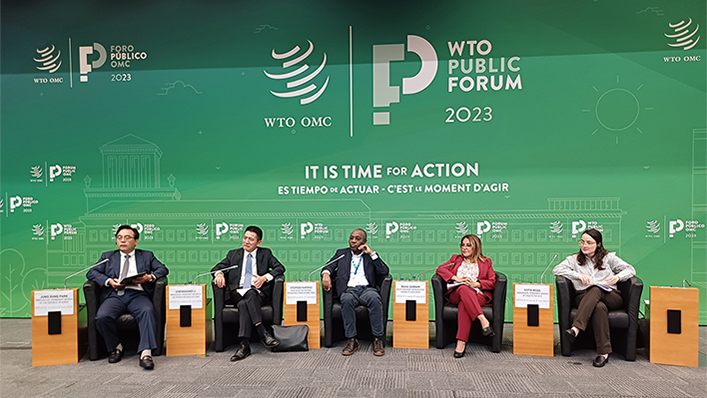
WTO members participating in the talks on investment facilitation for development (IFD) announced on 6 July the conclusion of the negotiations on the text of the Agreement following three years of intense text-based negotiations amongst over 110 WTO members at all levels of development. The announcement marked a milestone in the negotiations and underlined the common aspiration of IFD participants that the IFD Agreement will reach another landmark at the WTO’s 13th Ministerial Conference (MC13) to be held in Abu Dhabi in February 2024.
Ambassador Sofía Boza, co-coordinator of the negotiations, moderated the session. She stressed that the number of participants in the initiative has been steadily rising since its launch at the 11th WTO Ministerial Conference in Buenos Aires in 2017. She said that discussions “have been transparent, inclusive and open to all WTO members,” and noted that out of the more than 110 participating members, 77 are developing countries and 20 are LDCs.
Noting that the outlook for FDI in 2023 appears weak, Ambassador Boza emphasized the great potential of an IFD Agreement, which would be “the first of its kind to set global benchmarks for helping WTO members create an environment conducive to attracting investment.”
The other co-coordinator of the talks, Ambassador Jung Sung Park of the Republic of Korea, compared the IFD talks with a triathlon: “We have reached the finish line in the swimming, but cycling and the marathon are waiting for us,” he said. Extra efforts are to be made in the build-up to MC13, including the legal scrubbing of the text, translation into French and Spanish and outreach activities, and the incorporation of the IFD Agreement into the WTO rulebook.
Ambassador Park underlined that at a time of increasing talk about re-shoring and near shoring in trade, a binding IFD Agreement will make a strong case for development and re-globalization. “It will also send the message that the WTO is a relevant organization … We will show how we can make the WTO a richer and fast-moving organization.”
Looking forward in terms of how the future Agreement will be incorporated into the legal architecture of the WTO, he noted: “We are entering an unexplored land. Incorporating a joint statement initiative into the WTO rulebook as a stand-alone agreement is for the first time in WTO history, for which we do not have a navigation guide.”
Ambassador Li Chenggang of China spoke on behalf of the Friends of Investment Facilitation for Development (FIFD), the group of developing and LDC members who launched the IFD initiative. He said that currently there are more than 10 additional WTO members who have already initiated their domestic processes for a possible participation in the initiative.
Ambassador Li said the IFD Agreement is a global action to revitalize the global economy. He pointed out that according to the United Nations Conference on Trade and Development (UNCTAD), global FDI fell 26.7% from USD 1.76 trillion in 2015 to USD 1.29 trillion in 2022, while the annual investment deficit developing countries face continued to widen in the past two years – up from USD 2.5 trillion in 2015 to about USD 4 trillion in 2022 per year. Lack of sufficient FDI will hamper global efforts to boost economic development and achieve the UN Sustainable Development Goals by 2030, Ambassador Li said.
He also indicated that if the IFD Agreement becomes a multilateral action, it will contribute to building a new type of multilateralism at the WTO. He emphasized that the decision to incorporate the Agreement into the WTO legal framework “must be made by consensus.” As members prepare for MC13, the Chinese Ambassador recalled the spirit of good faith and cooperation which empowered members to achieve unprecedented success at the 12th Ministerial Conference in June 2022. He called for members to leverage the IFD Agreement “to pave the way for an even more successful MC13.”
Stephen Karingi, Director of the Regional Integration & Trade Division at the United Nations Economic Commission for Africa (UNECA), said that an IFD Agreement will be particularly relevant for Africa, which is seeing a prolonged FDI stagnation that reveals structural issues in the continent when it comes to attracting and retaining foreign direct investment.
“If we fail to provide quality, simplicity and predictability in policy and legal frameworks, it is going to become very difficult for investors to make decisions. And that is why this conversation that we are having here is very important for Africa,” he said. “This Investment Facilitation for Development Agreement is actually critical to unlocking Africa’s full FDI potential.”
Maha Gabbani, Saudi Arabia’s Deputy Permanent Representative to the WTO, underlined that the negotiated text “is inclusive and sustainable, development-centred, enables reforms and gives hope to developing countries and LDCs,” as it includes streamlined administrative procedures that will allow for reducing red tape and removing trade barriers.
The Agreement will also provide equal opportunities, especially for small and medium enterprises (SMEs) in developing countries and LDCs, as well as a great deal of transparency that will allow investors at all levels to have the information they need in their operations, she said.
“It is a win-win situation,” added Ms Gabbani, who said that integrating the Agreement into the legal architecture of the WTO will stress that the organization “is the cornerstone and the custodian of global trade governance,” empowering economies, creating jobs and encouraging sustainable development. “It will also prove and reinforce the relevance of this house to integrate and to give responses to the economic growth landscape.”
More information on the Joint Statement on Investment Facilitation for Development is available here.
Share
Reach us to explore global export and import deals